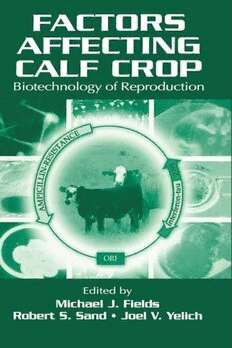Download Factors Affecting Calf Crop: Biotechnology of Reproduction PDF Free - Full Version
Download Factors Affecting Calf Crop: Biotechnology of Reproduction by Michael J. Fields, Robert S. Sand, Joel V. Yelich in PDF format completely FREE. No registration required, no payment needed. Get instant access to this valuable resource on PDFdrive.to!
About Factors Affecting Calf Crop: Biotechnology of Reproduction
In today's world, we are witnessing simultaneous breakthroughs in reproductive technologies, genomics, and molecular biology. Advances in molecular genetic technology and understanding of the bovine genome have led to the development of tools that can be used to enhance profitability on cow-calf enterprises. Factors Affecting Calf Crop: Biotechnology of Reproduction provides a detailed compilation of current and forthcoming technology for managing reproduction in cattle. The book discusses topics such as: approved techniques for controlling the estrous cycle in cattle; managing follicular growth with progesterone, estrogens, and prostaglandins; freezing, thawing, and transfer of cattle embryos; application of embryo transfer to the beef cattle industry; embryo transfer in topically adapted cattle; new factors affecting bull fertility; embryo collection and utilization technology, in vitro fertilization, somatic cell cloning, and genetic technologies; uses of real-time ultrasound; and sexed semen. Over 25 leading animal scientists have combined their expertise to produce the first single-source reference that covers successful reproductive techniques that will, most likely, be the wave of the future. Expansive in scope, the book addresses current biotechnologies as they impact the production of beef cattle. Written at a level to appeal to the researcher, commercial producer, or student, Factors Affecting Calf Crop: Biotechnology of Reproduction presents you with a wealth of technologies applicable to animal agriculture.
Detailed Information
| Author: | Michael J. Fields, Robert S. Sand, Joel V. Yelich |
|---|---|
| Publication Year: | 2001 |
| ISBN: | 9781420040838 |
| Pages: | 321 |
| Language: | English |
| File Size: | 4.486 |
| Format: | |
| Price: | FREE |
Safe & Secure Download - No registration required
Why Choose PDFdrive for Your Free Factors Affecting Calf Crop: Biotechnology of Reproduction Download?
- 100% Free: No hidden fees or subscriptions required for one book every day.
- No Registration: Immediate access is available without creating accounts for one book every day.
- Safe and Secure: Clean downloads without malware or viruses
- Multiple Formats: PDF, MOBI, Mpub,... optimized for all devices
- Educational Resource: Supporting knowledge sharing and learning
Frequently Asked Questions
Is it really free to download Factors Affecting Calf Crop: Biotechnology of Reproduction PDF?
Yes, on https://PDFdrive.to you can download Factors Affecting Calf Crop: Biotechnology of Reproduction by Michael J. Fields, Robert S. Sand, Joel V. Yelich completely free. We don't require any payment, subscription, or registration to access this PDF file. For 3 books every day.
How can I read Factors Affecting Calf Crop: Biotechnology of Reproduction on my mobile device?
After downloading Factors Affecting Calf Crop: Biotechnology of Reproduction PDF, you can open it with any PDF reader app on your phone or tablet. We recommend using Adobe Acrobat Reader, Apple Books, or Google Play Books for the best reading experience.
Is this the full version of Factors Affecting Calf Crop: Biotechnology of Reproduction?
Yes, this is the complete PDF version of Factors Affecting Calf Crop: Biotechnology of Reproduction by Michael J. Fields, Robert S. Sand, Joel V. Yelich. You will be able to read the entire content as in the printed version without missing any pages.
Is it legal to download Factors Affecting Calf Crop: Biotechnology of Reproduction PDF for free?
https://PDFdrive.to provides links to free educational resources available online. We do not store any files on our servers. Please be aware of copyright laws in your country before downloading.
The materials shared are intended for research, educational, and personal use in accordance with fair use principles.

